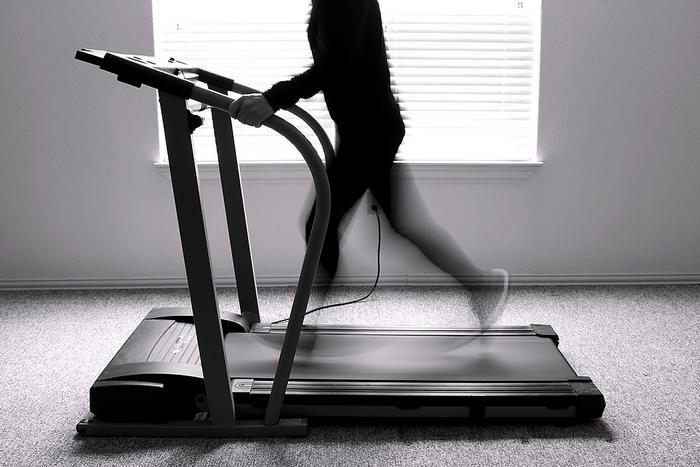A new UC Riverside study demonstrates that calorie restriction doesn’t deter mice from exercising, challenging the belief that dieting drains workout energy.
A new UC Riverside study demonstrates that calorie restriction doesn’t deter mice from exercising, challenging the belief that dieting drains workout energy.
The study, published in the journal Physiology & Behavior, shows that cutting calories by 20% did not significantly reduce the distance that mice voluntarily chose to run each day.
The researchers set out to understand what happens to mice when the amount of food available to them is reduced. The findings, they hoped, would be relevant to wild animals that do not always get as much food as they want on a given day, and also to humans, whose doctors often prescribe dieting.
It is somewhat difficult to obtain accurate data on the amount of voluntary exercise that humans engage in. Though it is easy to categorize what people recognize as voluntary exercise, like a trip to the gym, there is much gray area that’s hard to quantify, such as walking to a cafeteria to purchase lunch instead of eating a meal from a nearby lunch box.
Tracking what lab mice choose to do is much easier, and lab mice generally like to run on wheels for many hours per day. In this study, researchers saw the mice chose to run at similar levels, regardless of how much they ate.
“Voluntary exercise was remarkably resistant to reducing the amount of food by 20% and even by 40%,” said UCR biologist and corresponding study author Theodore Garland, Jr. “They just kept running.”
The researchers spent three weeks getting a baseline level of running activity for the mice, then a week with calories reduced by 20%, and another week at minus 40%. This experiment was done both with regular mice as well as “high runner” mice bred to enjoy running.
Though the high runners reduced their total distance slightly with 40% calorie restriction, the distance was only an 11% reduction. As they started out running three times farther per day than normal mice, the reduction is considered slight. “They’re still running at extremely high levels,” Garland said. The regular mice did not reduce their daily distance, even at 40% calorie reduction.
Because running gives a “runners high,” in part by increasing dopamine and cannabinoid levels in the brain, the researchers believe the mice were motivated to keep going even with less food. “Wheel running is a self-rewarding behavior,” Garland said.
In addition, the researchers were surprised to find that body mass was not significantly affected by the 20% reduction in calories in either the regular or high-runner mice. Although there was some drop in body mass with a 40% reduction, it was not as high as predicted.
“People often lose about 4% of their body mass when they’re dieting. That’s in the same range as these mice,” Garland said.
This study contributes to our understanding of why some people like to exercise and others don’t. In the future, the researchers are planning additional studies to understand why both the amount of voluntary exercise and body mass are so resistant to calorie restriction.
“There has to be some type of compensation going on if your food goes down by 40% and your weight doesn’t go down very much,” Garland said. “Maybe that’s reducing other types of activities, or becoming metabolically more efficient, which we didn’t yet measure.”
As habitat destruction causes food shortages for wild animals, this type of information could be instrumental for people trying to preserve species. And for the many people interested in improving their health, the implications could be similarly significant.
“We don’t want people on diets to say, ‘I don’t have enough energy, so I’ll make up for it by not exercising.’ That would be counterproductive, and now we know, it doesn’t have to be this way,” Garland said.
Journal
Physiology & Behavior
DOI
10.1016/j.physbeh.2024.114582
Article Title
Effects of food restriction on voluntary wheel-running behavior and body mass in selectively bred High Runner lines of mice
Article Publication Date
18-May-2024





